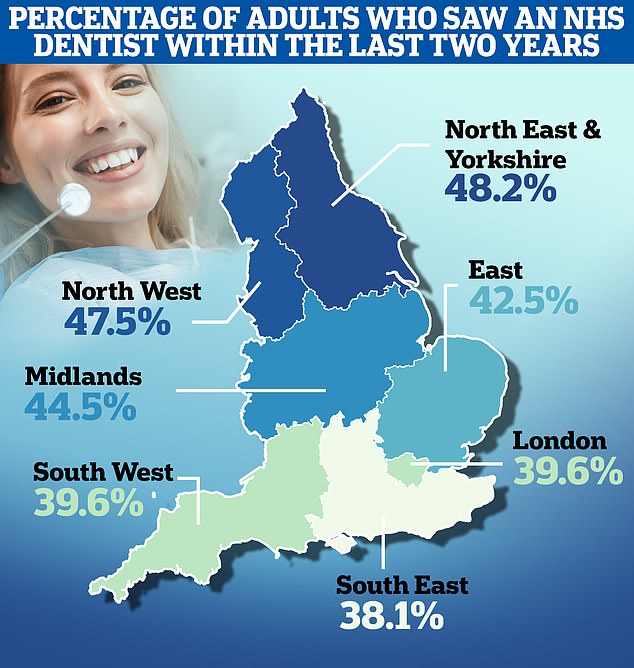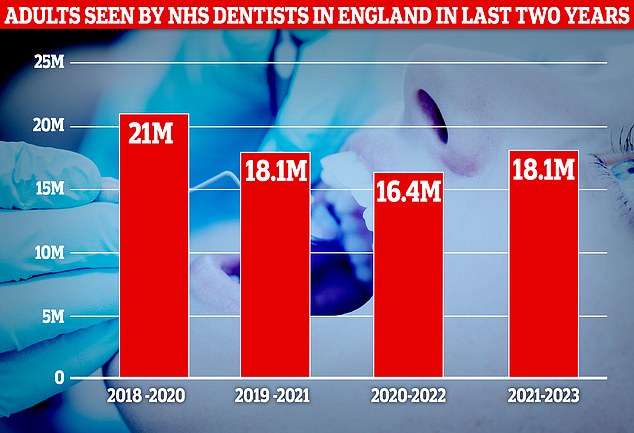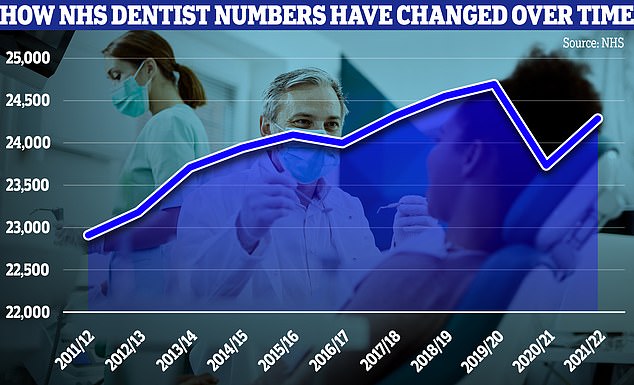Dental deserts are forcing three in 10 Brits to take time off work due to toothache, research has found
A third of Brits have been forced to take time off work due to toothaches after being unable to go to the dentist, a survey has found.
This is evident from an opinion poll among more than 5,000 British people health insurer Simplyhealth found that 28 percent had taken sick leave due to toothache.
Of these, seven percent had such severe pain that they had to take a week off.
If this is extrapolated to the rest of the population, the company says this is equivalent to the loss of 23 million sick days in Britain per year.
Meanwhile, 12 per cent of Brits were struggling in a so-called dental desert and unable to make an appointment with an NHS dentist, the research found.
A survey shows that around a third of Brits have been forced to take time off work due to toothaches after being unable to visit a dentist (stock image)

Only 43 percent of over-18s were seen by a dentist in the 24 months to June this year, compared to more than half in the same period before the pandemic hit
Britons were also concerned about the cost of a private visit, with one in ten saying they would no longer go to a dentist because they could not afford the treatment.
Simplyhealth’s clinical director, Dr Catherine Rutland, said the findings show that ‘dental care in Britain is well behind the level it should be at’.
The research, carried out between June and July this year, adds further evidence to Britons’ dental problems.
A recent Health and Social Care Committee inquiry described the state of the NHS dental service as ‘totally unacceptable in the 21st century’.
Last month, official NHS figures revealed that fewer than half of adults in England have seen a dentist in the past two years.
It means 3.8 million fewer adults had their teeth checked by an NHS dentist compared to pre-coronavirus levels.
Some regions are also hit harder than others.
Earlier this year, a MailOnline analysis of England’s ‘dental deserts’ found that some areas have just one dental practice offering NHS treatments for every 13,000 people.
Experts have repeatedly warned that the difficulties in accessing NHS dentists could lead to people forgoing essential treatments or resorting to do-it-yourself dentistry, risking more expensive care in the long run.
There are also fears that cases of oral cancer, which dentists often spot in the earliest stages during routine checkups, will be missed.
Dentists have reported seeing patients struggling to get an appointment with the disease, warning that ‘people will die because of this’.
The crisis has also seen Brits resort to DIY dentistry, flying in for treatment or leaving without care because they couldn’t afford expensive private dental fees.
The few dentists taking new NHS patients are overwhelmed, with some facing queues of 100 and almost 30,000 calls for just a few dozen spaces.
The British Dental Association recently warned that such scenes could become ‘the new normal’.
Last year, a joint survey by the BBC and the British Dental Association found that as many as 90 percent of NHS dental practices were unable to offer appointments to new adult patients.
NHS dentistry has been in crisis for years, with industry leaders claiming the sector is chronically underfunded, making it financially unviable to provide treatments.

A total of 18.1 million adults visited their dentist in the two years to June 2023, up from 16.4 million in the 24 months to June 2022. But this is still well below 21 million in the two years to June 2020.

This graph shows the number of dentists who carried out NHS activities each year. This figure fell sharply during the Covid pandemic but has recovered slightly to just over 24,000 according to the latest data
One of the main issues is that under a previously controversial contract, NHS dentists were paid per job, rather than for the amount of work required.
This essentially meant that they received the same funding for a patient needing one refill as for a patient needing three, despite the latter taking much longer.
This combined with lower wages compared to the lucrative private sector, long working hours and the stress of burnout, forcing them to flee the healthcare system, dental authorities claim.
Although dental contract reforms have recently been reformed as part of the government’s efforts to increase access to NHS dentistry, industry bodies say these do not go far enough.
The problem is further compounded by the fact that as more dentists leave the NHS, the remaining dentists are swamped by more and more patients, resulting in a domino effect.
The crisis has led to this Prime Minister Rishi Sunak announced this earlier this year British dentists would have to work for the NHS for years after completing their studies.
